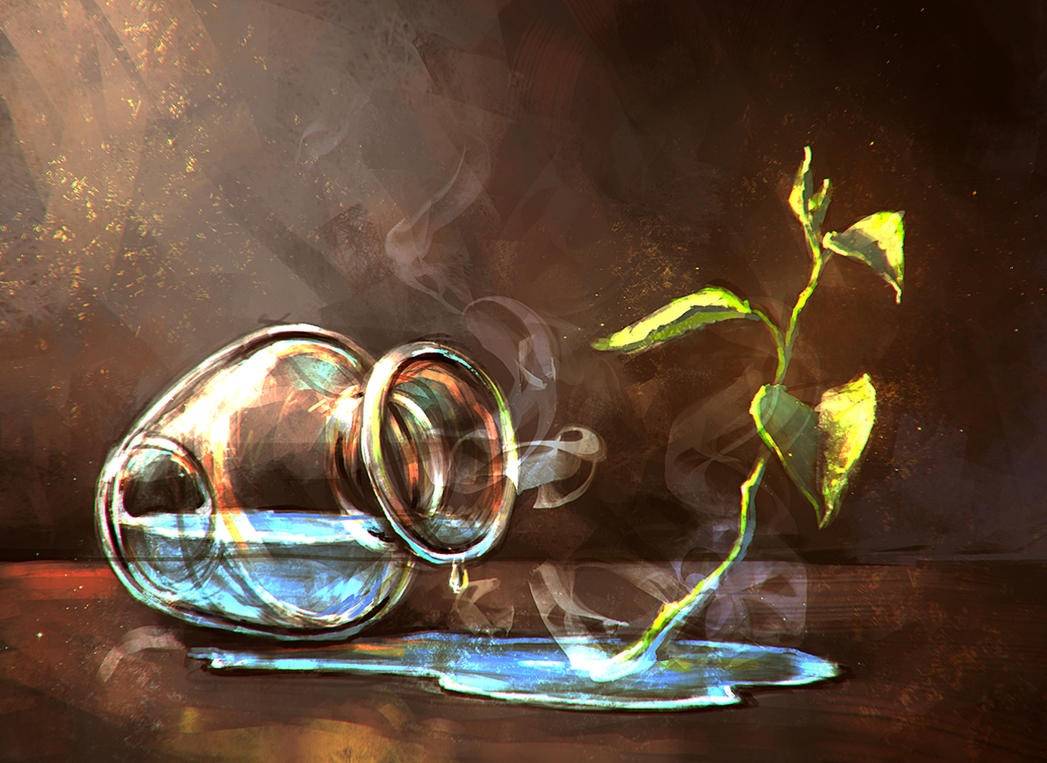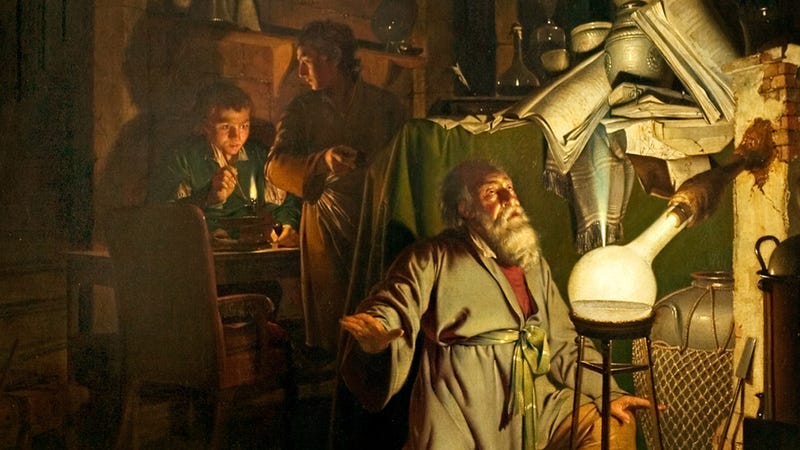Lesson 9) Fountain of Youth
Can you believe it? Here we are together one last time before your O.W.L.s in your last lesson of Alchemy Year Five. It’s amazing how fast time flies! It feels like yesterday when all of you attended your first Alchemy class, eager to learn the mysteries of this course. Now you have all completed at least one transmutation and, hopefully, your first spagyric elixir. Speaking of, that's due today so you should have it with you, completed. Definitely be prepared to write quite a bit about it at the end of the lesson. Anyway, I guess that’s enough of memory lane for now. I’m sure all of you are particularly interested in today’s topic.

Death. It’s something that affects us all at some point in our lives, whether it’s the death of a loved one or yourself. Over time, humans seek ways to push death back or prevent it from ever happening. Only a few alchemists have been successful in creating something to induce immortality, but even then, you can only prolong the inevitable for so long. Just look at Nicolas Flamel. Nevertheless, immortality remains one of the main goals in alchemy. Depending on what branch of alchemy you are looking at, there are two types of immortality that can be achieved: immortality of the soul and immortality of the body. Immortality of the soul is when the alchemist aims to have their soul last much longer than the life capacity of their body, the physical vessel. This is mainly associated with branches of spiritual alchemy and developing the soul and spirit through practices such as meditation. However, we will primarily be dealing with Immortality of the body.
 Immortality of the body deals with extending the life capacity, slowing physical aging, and operating the body’s functions. How does any of this have to do with medicinal alchemy? Simply put, if a disease is a disorder of the structure or function of a living organism and death is the cessation of all vital functions, perhaps you could say that death is life’s greatest affliction. In this thought process, immortality is a treatment for death. Think about it, if you find the secret to immortality and fall ill, you can’t die because you’re immortal. Sure, you can still be very sick, but you are alive and can get treated for the disease. Though, I suppose I can’t say for sure in the case of a lethal physical injury or a certain Unforgivable Curse that you could find this loophole, but I digress.
Immortality of the body deals with extending the life capacity, slowing physical aging, and operating the body’s functions. How does any of this have to do with medicinal alchemy? Simply put, if a disease is a disorder of the structure or function of a living organism and death is the cessation of all vital functions, perhaps you could say that death is life’s greatest affliction. In this thought process, immortality is a treatment for death. Think about it, if you find the secret to immortality and fall ill, you can’t die because you’re immortal. Sure, you can still be very sick, but you are alive and can get treated for the disease. Though, I suppose I can’t say for sure in the case of a lethal physical injury or a certain Unforgivable Curse that you could find this loophole, but I digress.
I am sure all of you are somewhat familiar with the Philosopher’s Stone, as we briefly mentioned it in Year Two. The Philosopher’s Stone is capable of many things. Two of these things affect immortality and are the subject of today’s topic: the Elixir of Life and Panacea.

The Elixir of Life is a sweet, aromatic elixir that prolongs the life of the drinker. The elixir does not have infinite effects on the drinker, though. In fact, the potion must be administered regularly. Anyone who relies on the elixir will die shortly after the effects wear off if another quantity of it isn’t taken. We have mentioned the fate of Nicolas Flamel and his wife, Perenelle, before. After they agreed to the Philosopher’s Stone being destroyed, their supply of the elixir ran out, and they died after living for a little over 680 years. The Elixir of Life is also capable of reincarnating an earthbound, disembodied soul. Although this particular use isn’t as commonly known in the alchemical community, it was why Voldemort sought out the Philosopher’s Stone in the first place. The elixir has also been said to grant the drinker eternal youth, however, this hasn’t necessarily been proven as the most recent observance of the elixir taking effect was with the Flamels. If anything, it may have halted the physical maturing of their bodies when they began taking it and prevented any deterioration that would have come with aging. I would like to note that the Flamels were also not the first alchemists to possess the elixir. In some cultures, the Elixir of Life is also said to cure any disease, which again, has not necessarily been proven as there were no public records in the alchemical community of the Flamels falling ill.
 Unfortunately, the Flamels never left behind any hints of the recipe for the Elixir of Life or the Philosopher’s Stone. Trust me, I spent several hours a day examining various Flamel journals and texts in the library during my time at Beauxbatons and still turned up with nothing. However, the one ingredient that is absolutely confirmed for the elixir is, well, the Philosopher’s Stone. Without the Stone, more quantities of the elixir couldn’t be made to sustain Nicolas and Perenelle’s lifespans. However, then comes the question of “Wouldn’t the Philosopher’s Stone eventually run out after being used to prepare the Elixir of Life a certain amount of times?” In order to answer that, you would need to answer questions like “How is the Elixir of Life prepared?” and “How is the Philosopher’s Stone used in the Elixir of Life?” There have been theories ranging from the Elixir of Life being brewed like a regular potion, to it being a much lengthier process and similar to a spagyric elixir. Depending on how you believe the preparation of the elixir is handled, you can determine how the stone may have been used. Some alchemists have hypothesized anything from grinding up a small portion of the stone to throwing the whole stone in the cauldron. Personally, my best guess is that the stone is submerged in the concoction for a certain amount of time to let the magical properties disperse into the liquid before being removed. Perhaps I’m right, perhaps not. Either way, this still remains probably one of the greatest mysteries to alchemists worldwide.
Unfortunately, the Flamels never left behind any hints of the recipe for the Elixir of Life or the Philosopher’s Stone. Trust me, I spent several hours a day examining various Flamel journals and texts in the library during my time at Beauxbatons and still turned up with nothing. However, the one ingredient that is absolutely confirmed for the elixir is, well, the Philosopher’s Stone. Without the Stone, more quantities of the elixir couldn’t be made to sustain Nicolas and Perenelle’s lifespans. However, then comes the question of “Wouldn’t the Philosopher’s Stone eventually run out after being used to prepare the Elixir of Life a certain amount of times?” In order to answer that, you would need to answer questions like “How is the Elixir of Life prepared?” and “How is the Philosopher’s Stone used in the Elixir of Life?” There have been theories ranging from the Elixir of Life being brewed like a regular potion, to it being a much lengthier process and similar to a spagyric elixir. Depending on how you believe the preparation of the elixir is handled, you can determine how the stone may have been used. Some alchemists have hypothesized anything from grinding up a small portion of the stone to throwing the whole stone in the cauldron. Personally, my best guess is that the stone is submerged in the concoction for a certain amount of time to let the magical properties disperse into the liquid before being removed. Perhaps I’m right, perhaps not. Either way, this still remains probably one of the greatest mysteries to alchemists worldwide.
There are other ingredients that have been theorized to be in the Elixir of Life. Chinese alchemists believe long-lasting substances such as jade, cinnabar, and hematite could be ingredients of the elixir due to their endurance. Both Chinese and Indian alchemists have made connections between the consumption of gold and immortality, with the latter also writing about mercury being another possible ingredient. If we think back to Year Four Lesson Five when we mentioned symbolism, we remember dew was not just a symbol but also a very probable ingredient. Other herbs and roots have been brought up as possible ingredients that could have been added. The only problem with simply testing out these ingredients is some of them are very toxic. Muggles and wizards alike have died from elixir poisoning. Most notably, several Chinese emperors and nobles have died ironic deaths from trying to prolong their lives starting from around 210 B.C.E. Even then, Daoist alchemists and the fangshi still kept experimenting with longevity elixirs well into the 18th century C.E. Remember when I mentioned last lesson how too much of any metal can be toxic? Several alchemists met their demise through metal poisoning in attempted Elixirs of Life. Even Sir Isaac Newton was showing symptoms of mercury poisoning in his later life. I would strongly advise against experimenting with and ingesting any Elixirs of Life by yourself. It might do the opposite of what you want it to do.

 Our last topic today is the well-renowned Panacea. Panacea is a remedy rumored to be the cure of all diseases and prolong life indefinitely. Now I know what you’re thinking, “Wasn’t Azoth the universal cure?” and you’re right, Azoth is still the universal cure. Panacea is more of a connection between Azoth and the Elixir of Life, as well as the Philosopher’s Stone. It’s named after the Greek goddess of universal health and remedy, Panacea, who is the daughter of Asclepius and Epione. As you may remember, the Rod of Asclepius is used to symbolize Azoth. Panacea also had a potion that she used to heal the sick, which brought about the concept of the medicinal Panacea in alchemy. So there is a bit of a mythological connection in all of this.
Our last topic today is the well-renowned Panacea. Panacea is a remedy rumored to be the cure of all diseases and prolong life indefinitely. Now I know what you’re thinking, “Wasn’t Azoth the universal cure?” and you’re right, Azoth is still the universal cure. Panacea is more of a connection between Azoth and the Elixir of Life, as well as the Philosopher’s Stone. It’s named after the Greek goddess of universal health and remedy, Panacea, who is the daughter of Asclepius and Epione. As you may remember, the Rod of Asclepius is used to symbolize Azoth. Panacea also had a potion that she used to heal the sick, which brought about the concept of the medicinal Panacea in alchemy. So there is a bit of a mythological connection in all of this.
Even though Panacea is a potion in mythology, alchemists aren’t sure if the actual Panacea is truly a potion. One of the stronger theories is that Panacea is a tincture made in order to create the Elixir of Life. This would work out if the elixir was made in a similar process to spagyric elixirs. Another theory is that Panacea is created by combining both the Elixir of Life and Azoth, making it the ultimate remedy. There’s a somewhat popular theory that Panacea is a completely separate concoction from both the Elixir of Life and Azoth and that it’s also made with the Philosopher’s Stone, much similar to the elixir. Either way, there is even less information on Panacea than the Elixir of Life, surprisingly, however, it still remains the center of several alchemists’ work.
That will be all for today, especially since O.W.L.s are coming up for all of you. What I have for you today is a short quiz along with a lab journal entry for your spagyric elixir project. The journal entry is quite lengthy, but it should be relatively easy as you started your project early in the year, am I right?
With that, Alchemy 501 has officially concluded! I hope you all have learned a lot about medicinal alchemy and that you had fun glimpsing the laboratory side of things. I sincerely wish you all good luck on your O.W.L.s so that we can meet again in Year Six for more alchemical adventures!
- ALCH-401
Enroll
-
Living Forever
Quiz -
Spagyric Elixir Project
Essay
-
Elizabeth Schulte
Head Student
-
Sammy Morse
Professor's Assistant


